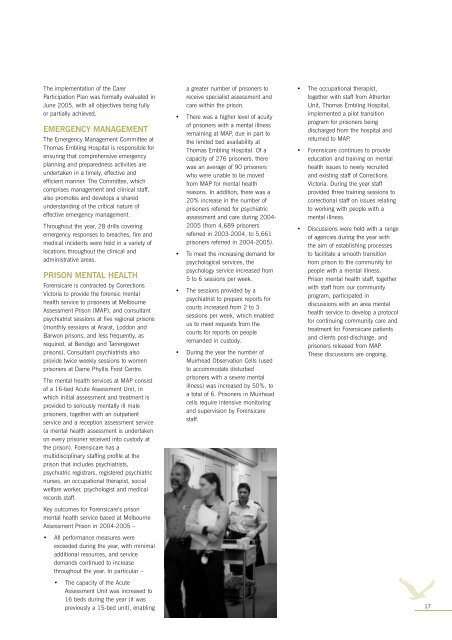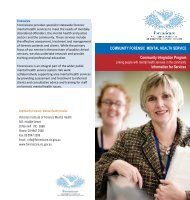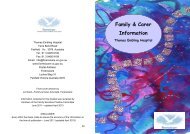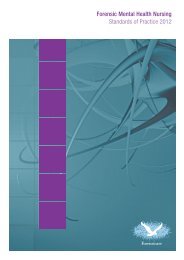Annual Report 2004-2005 - Forensicare
Annual Report 2004-2005 - Forensicare
Annual Report 2004-2005 - Forensicare
You also want an ePaper? Increase the reach of your titles
YUMPU automatically turns print PDFs into web optimized ePapers that Google loves.
The implementation of the Carer<br />
Participation Plan was formally evaluated in<br />
June <strong>2005</strong>, with all objectives being fully<br />
or partially achieved.<br />
EMERGENCY MANAGEMENT<br />
The Emergency Management Committee at<br />
Thomas Embling Hospital is responsible for<br />
ensuring that comprehensive emergency<br />
planning and preparedness activities are<br />
undertaken in a timely, effective and<br />
efficient manner. The Committee, which<br />
comprises management and clinical staff,<br />
also promotes and develops a shared<br />
understanding of the critical nature of<br />
effective emergency management.<br />
Throughout the year, 28 drills covering<br />
emergency responses to breaches, fire and<br />
medical incidents were held in a variety of<br />
locations throughout the clinical and<br />
administrative areas.<br />
PRISON MENTAL HEALTH<br />
<strong>Forensicare</strong> is contracted by Corrections<br />
Victoria to provide the forensic mental<br />
health service to prisoners at Melbourne<br />
Assessment Prison (MAP), and consultant<br />
psychiatrist sessions at five regional prisons<br />
(monthly sessions at Ararat, Loddon and<br />
Barwon prisons, and less frequently, as<br />
required, at Bendigo and Tarrengower<br />
prisons). Consultant psychiatrists also<br />
provide twice weekly sessions to women<br />
prisoners at Dame Phyllis Frost Centre.<br />
The mental health services at MAP consist<br />
of a 16-bed Acute Assessment Unit, in<br />
which initial assessment and treatment is<br />
provided to seriously mentally ill male<br />
prisoners, together with an outpatient<br />
service and a reception assessment service<br />
(a mental health assessment is undertaken<br />
on every prisoner received into custody at<br />
the prison). <strong>Forensicare</strong> has a<br />
multidisciplinary staffing profile at the<br />
prison that includes psychiatrists,<br />
psychiatric registrars, registered psychiatric<br />
nurses, an occupational therapist, social<br />
welfare worker, psychologist and medical<br />
records staff.<br />
Key outcomes for <strong>Forensicare</strong>’s prison<br />
mental health service based at Melbourne<br />
Assessment Prison in <strong>2004</strong>-<strong>2005</strong> –<br />
• All performance measures were<br />
exceeded during the year, with minimal<br />
additional resources, and service<br />
demands continued to increase<br />
throughout the year. In particular –<br />
a greater number of prisoners to<br />
receive specialist assessment and<br />
care within the prison.<br />
• There was a higher level of acuity<br />
of prisoners with a mental illness<br />
remaining at MAP, due in part to<br />
the limited bed availability at<br />
Thomas Embling Hospital. Of a<br />
capacity of 276 prisoners, there<br />
was an average of 90 prisoners<br />
who were unable to be moved<br />
from MAP for mental health<br />
reasons. In addition, there was a<br />
20% increase in the number of<br />
prisoners referred for psychiatric<br />
assessment and care during <strong>2004</strong>-<br />
<strong>2005</strong> (from 4,689 prisoners<br />
referred in 2003-<strong>2004</strong>, to 5,661<br />
prisoners referred in <strong>2004</strong>-<strong>2005</strong>).<br />
• To meet the increasing demand for<br />
psychological services, the<br />
psychology service increased from<br />
5 to 6 sessions per week.<br />
• The sessions provided by a<br />
psychiatrist to prepare reports for<br />
courts increased from 2 to 3<br />
sessions per week, which enabled<br />
us to meet requests from the<br />
courts for reports on people<br />
remanded in custody.<br />
• During the year the number of<br />
Muirhead Observation Cells (used<br />
to accommodate disturbed<br />
prisoners with a severe mental<br />
illness) was increased by 50%, to<br />
a total of 6. Prisoners in Muirhead<br />
cells require intensive monitoring<br />
and supervision by <strong>Forensicare</strong><br />
staff.<br />
• The occupational therapist,<br />
together with staff from Atherton<br />
Unit, Thomas Embling Hospital,<br />
implemented a pilot transition<br />
program for prisoners being<br />
discharged from the hospital and<br />
returned to MAP.<br />
• <strong>Forensicare</strong> continues to provide<br />
education and training on mental<br />
health issues to newly recruited<br />
and existing staff of Corrections<br />
Victoria. During the year staff<br />
provided three training sessions to<br />
correctional staff on issues relating<br />
to working with people with a<br />
mental illness.<br />
• Discussions were held with a range<br />
of agencies during the year with<br />
the aim of establishing processes<br />
to facilitate a smooth transition<br />
from prison to the community for<br />
people with a mental illness.<br />
Prison mental health staff, together<br />
with staff from our community<br />
program, participated in<br />
discussions with an area mental<br />
health service to develop a protocol<br />
for continuing community care and<br />
treatment for <strong>Forensicare</strong> patients<br />
and clients post-discharge, and<br />
prisoners released from MAP.<br />
These discussions are ongoing.<br />
• The capacity of the Acute<br />
Assessment Unit was increased to<br />
16 beds during the year (it was<br />
previously a 15-bed unit), enabling<br />
17














